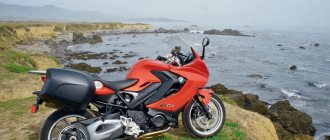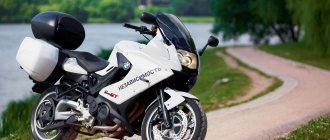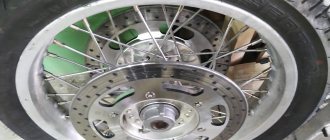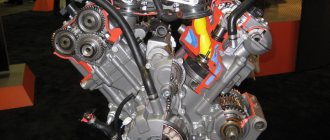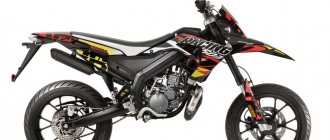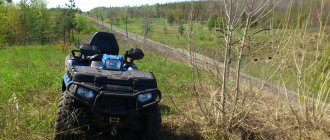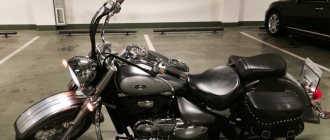BMW F800ST
Model class : sports-tourist
Years of production/sales : 2006-2012
BMW F800ST model was first introduced in 2006, simultaneously with the BMW F800S model, differing from it mainly in the presence of a full fairing and a different type of steering wheel (ST has a higher classic steering wheel, S has lower clip-ons). Otherwise, both models are almost identical.
It is obvious that the BMW F800S/ST became a successor to the BMW F650CS - both models are distinguished by a cantilever rear swingarm and a belt drive. However, now the BMW F800S/ST positions itself not as a road motorcycle, but as a “plastic” sport-tourer. A more interesting appearance and modern technical equipment led to the fact that the BMW F800ST model gained popularity and sold quite well.
The BMW F800ST is based on the in-line 2-cylinder Rotax engine used in all modern BMW F-series models, producing 85 hp. power and 86 Nm of torque. The engine is characterized by fairly low vibrations and decent dynamic characteristics, accelerating the BMW F800ST to 100 km/h in 3.8 seconds and reaching a top speed of 221 km/h. A special feature of the engine is the use of a 360° crankshaft, which makes the exhaust sound similar to BMW's more expensive boxer-engined Boxer models. To suppress the vibrations inherent in this layout, BMW equipped the engine with a third connecting rod and an additional balancer shaft.
Other features of the BMW F800ST include an aluminum frame, a 6-speed gearbox, a cantilever rear swingarm, a belt drive to the rear wheel, powerful 4-piston front brakes, a 16-liter fuel tank and a 209 kg curb weight.
The BMW F800ST model was available until 2013, after which it was replaced by an updated version - the BMW F800GT.
Judging by what is happening outside the window, we have to admit that the 2022 season is over... Therefore, it’s time to take stock, write notes “about how I spent the summer” and try in every possible way to entertain each other in such a dull and depressing time as the off-season
This is my first motorcycle, so I don’t have much to compare it with, but I can still tell you something. I would like to note that nothing criminal (pah-pah-pah) has happened over the past two seasons - the service is just minor things.
At the beginning of June 2022, when the weather was quite hot, I began to notice that the cooling fan was thrashing for a very long time, and once it even reached 4 sticks and a warning came out. The problem was solved by flushing the cooling system (as far as possible - I did not dare to use chemicals, because it would not be possible to drain the system dry) and replacing the antifreeze. I ordered the original one, but it still stands on the shelf because... Without waiting, I filled it with G13 from HEPU and everything was fine. My comrades advised changing it at least once every two years. According to the manual, there is no replacement interval at all; apparently, BMW believes that antifreeze is eternal. According to the same manual, if you still have to drain the slurry (and this is done through a tube going to the water-oil heat exchanger), you need to change the rubber sealing rings. Didn’t change it, doesn’t poison it, everything’s ok.
Before my trip to St. Petersburg, I discovered that the left pen was sweating a little with oil. I ordered oil seals and went on a long trip, after which, at a mileage of 21,000, I took the motor back to a service center, where this same fork was rebuilt. The master said that he found a piece of some kind of bitumen on the mirror, which, apparently, stuck there while driving through the area being repaired, hardened and, ultimately, killed the oil seal. The rest of the maintenance in the 2022 season was limited to only changing the oil and filters and the low-beam light bulbs, which turned out to be rather short-lived (nightbreakers and similar “major” light bulbs shine brighter to the detriment of their service life, but here the low beam turns on automatically when the engine starts). Although no... one joke was still discovered.
Praise to the wonderful roads of the city of Yaroslavl. I was returning home along Oktyabrya Avenue one day and hit a big hole, after which I noticed that the light from my headlight was mainly illuminating road signs and the tops of trees. Low beam... It turned out that the reflector jumped off the corrector guide due to the impact and went to a position not intended by the design. Getting it back turned out to be a hemorrhoid (the headlight unit is not removable), but the F800 owners club said that this was a known problem and with the help of a pair of tweezers, a thin screwdriver, a headlamp, a piece of wire, a couple of hours of time and some kind of mother, quite solvable. Unfortunately, this procedure had to be done several times. Whether this is due to a design flaw or the sad state of the roads in the capital of the Golden Ring is unknown.
The 2022 season was completed at the very end of October and, as further weather showed, if you had some irresistible desire, you could ride at least until mid-December (it was disgusting, cloudy, wet, slushy and generally lousy, but warm, there was even grass on the lawn turned green), but the horse was put in a stall. The odometer showed something like 27800 km.
The 2022 season was uncorked entirely on February 27 with an attempt to go for a technical inspection (unsuccessful, however - the expert, despite the recording, simply went home). I received this same technical inspection on March 5th; even during March there were some irregular rides (for example, in mid-March, in the wake of coronavirus hysteria and food rush, it was experimentally found that it is easy to get into the luggage system and backpack, without extending the telescopic cases half the cart with grub comes in). On my birthday, March 27, I went to work on a motorcycle and, after that, left it in the parking lot, so from this date we can consider the beginning of the regular motorcycle season)) Yes... I was able to get insurance only through an agent, e-osago is what something nalyubilovo.
At the very beginning of the season, in the evening, I think it was March 28, I caught a pretty big hole and bent the front disc; I only noticed the dent later when I stopped to look. The first thing I noticed was the headlight that had fallen off (as can be seen in the video)…
Well, there was an opportunity to film the story with the headlight and at the same time change the air filter...
Actually, almost immediately I was ready to replace the rear cylinder (the one I bought had been lying around for a month and a half already), and I took it to a tire shop along with the front wheel. The rear tires were changed and balanced, but they refused to edit the disc. Like, you have two wheels, we won’t give any guarantee that it won’t burst and all that. Sadness... I looked at the price of a new one and my sadness became even stronger. It’s almost impossible to find it at a disassembly site - the model is not the most popular, and the pistachios have a different spoke pattern and generally have different bearings with a different axis. And if anything comes across in the analysis, it’s some kind of frontal impact, from which the front disc and fork primarily suffer. I only found it once for 20k and... never took it. That's how I ride with a bent one. I hope to do something about it during the off-season.
After the sad story with the front disc, I decided to stretch the steering bearings. I did everything according to the service manual and found that there was a lock in the middle position. I ordered from two places at once. It was just when the non-working days regime was announced. As a result, they came from both places (one from an online store with bearings, the second from an existential store). Signed up for the service. The mileage was approaching 30k, so at the same time I took the valve cover gasket I had purchased in advance and asked to check the valve clearances (should have been done at 20k, but I didn’t). A guy on a K1600GT came to the service with me to replace the ignition module and, perhaps because of this, the repair took two days (on the K series with a transverse engine, the cylinder block is strongly tilted forward and in order to stupidly get to the spark plugs, you need just remove the radiator). The bearings were replaced, the gaps were measured and nothing criminal was found - everything was within tolerance. True, they left a couple of surprises, which I discovered only towards the end of the season.
At 34000 I noticed strange behavior of the rear suspension. I hung the rear one on the center console - the pendulum does not play, what is it? I tried moving the wheel up and down. It's loose... well, oh my... I also discovered that the preload knob moves with the wheel, but it shouldn't. In general, the shock absorber bushing stupidly fell apart. Let us once again say a big thank you to the wonderful Yaroslavl roads. We arm ourselves with a printout from the RSD and dismantle it (how many new curses were invented during this process! If in the version without ESA everything is simple, then with it the actuator wiring from the shock absorber laid through the bowels of the motorcycle makes the whole process unforgettable). Yes, he got it pretty bad...
What does the catalog say? Not detailed separately? Ok, how much does depreciation cost? Well, just for fun... #$^@&, how much???!!! 60 thousand?! Ok, what can you do about this? In the end, I gave it to a store that sharpens polyurethane silents. They did it in a couple of days. The issue price is 640 rubles. Reassemble in reverse order. It turned out to be easier. Maybe because I was mentally prepared, or maybe because it was really simpler.
After a thousand or two kilometers I discovered a crack in the drive belt. The drive belt for the F800GT is a pain... The original costs under 30k. A non-original from Contitech has appeared (essentially an original, only BMW is not written), article number CT1208, and there are big problems with availability. At the beginning of the season, we tried to order a batch of 5 belts for 100 euros through a group of owners through the Conti dealer. We never got it and in the end we got our money back. Just in time for my belt to hint that it was time to change it. I outlined the dimensions of the crack with a paint marker and drove carefully for another three weeks until the belt arrived. Not for 100 euros, but for almost 13 thousand rubles (F800ST owners chuckle sarcastically, but it’s still better than the original from the dealer).
Replacement, in general, is not difficult. The only caveat is the stretch. I did not loosen the eccentric, as required by RSD, but simply took off the old one and put on a new one. A colleague in misfortune from the F800 club took a screenshot from the book, which says that the tension can be checked with a steelyard and a ruler. Checked, it's ok. Only the lower part of the protection will have to be removed... I looked at the old belt and the picture of its damage turned out to be much sadder than it was visible. Also, while manipulating the belt, I noticed that the damper in the drive pulley of that one... had run out... We go to RSD - it costs 7 and a few thousand kopecks, we curse, we buy, we receive and... was it das? What is this, for one elastic band of four 7 pieces? Either for real, or somewhere they fell in love with me. 28 thousand for a piece of rubber is, perhaps, too much even for a BMW... In the store where they sharpened the silent compound for my shock absorber, they said that they couldn’t grind it, and they wouldn’t cast it. This problem needs to be resolved in the off-season. Maybe we will master the technology of making silicone molds and polyurethane casting.
At 37,000 I made a fairly large replacement of consumables - oil, filters, spark plugs and pads. The oil I use is Motul 7100 15w-50, the oil filter is Mann MW75, the air filter is Mahle LX1293, I change the oil and oil filter every 5000 km, I took TRW pads (for the price of one pair of Brembo you can buy TRW all around), Denso XU24EPR-U spark plugs (before that they were changed immediately after purchases, mileage was 17800, it seems). By the time of replacement, almost 20,000 had been knurled on the spark plugs. The interval prescribed in RSD was 40,000. The gap on the removed spark plugs was measured to be 0.9 mm. The norm is 0.8 - 0.9. When I installed them, I set them to 0.8. In general, you shouldn’t wait for 40,000, the coils don’t like a large gap. The gap could have been adjusted, but if you bought new spark plugs, then why not install them.
Here is a lyrical digression.
Lately it seemed to me that the motorcycle was riding somehow wrong. Well, it seems that last season things were somehow more cheerful. Well, who the hell knows... it doesn’t burn oil, fuel consumption is normal, there are no extraneous noises, I don’t drive very fast, but oh well... Some Lexus hit me at a traffic light? Well, I wasn’t in any particular hurry and anyway, I have a crack in my belt. And now, replacing the spark plugs, for which it was necessary to remove the airbox. The devil pulled me to turn up the gas and look at the dampers... I open it all the way, and the dampers open a maximum of 2/3. WTF? It is known that the F800GT has the option of throttling up to 60 penny horses. Do you know what she is? You just need to transfer the throttle cable from one stream in the sector near the dampers to another! That's all! You turn the gas to full, but in fact - only 2/3. I looked at the photo that we took when we changed the spark plugs after buying the motorcycle... There the cable is standing on the outer stream, small, at full power. It was also standing on the inner, large one. After a short analysis, I figured out that the service mechanics were the last to climb there when they were looking at the valves and that they had to disconnect this cable, otherwise it would get in the way. And, apparently, due to inattention, they installed a choke on me, with which I skated for 70 percent of the season. And I didn’t notice. But I didn’t notice because the maintenance was in April, I managed to get used to the behavior of the motorcycle, and in general in the spring, while I was regaining my skills and it was cool, I was in no hurry and didn’t unscrew it. It seems like nothing, but a residue remains... Oh yes... I also missed the bolt that secures the battery and the last time the battery was removed... yes, yes... there, at the service station. Okay, I could have lost the bolt too. I think that there is no point in saying that the motorcycle’s response to gas changed significantly after the manipulations. Among other things... this season I had as many as three punctures. Moreover, the second and third happened at the same time - just bingo. It’s good that there are tire pressure sensors and I found out about troubles before they had the opportunity to happen. But with the second one it turned out really offensive. Again, praise to Yaroslavl roads and the people responsible for their maintenance. The puncture, by the way, happened on the same road as the incident with the disc (South-Western Circle, M-8, if that), but in a different place. The stone turned out to be 3 centimeters long, like someone’s tooth. And there was another nail lurking next to it... The end of the season was successful, not like the summer. The weather was pleased with the complete absence of rain throughout the second half of September and the first 2 weeks of October, so every weekend we went somewhere - Rostov Veliky, Kostroma, Plyos, Ivanovo, Vyatskoye, and I finished it at around 40,300 km. What needs to be done in the off-season: -replacement of consumables (filters, oil, antifreeze, brake fluid) -check/preventatively replace the bearings in the front wheel (in a good way - straighten it at last or change it) -maintenance of the fork (oil change, oil seals, anthers) -replacement of the fuel filter (not detailed separately, but people already know what kind of filter it is) -replacement of the drive pulley damper -replacement of tires (the front for sure, the rear - I think, there are already three fungi sticking out in it) In general, as it seemed to me , the flight is normal.
Specifications
Technical characteristics of BMW F800ST:
| Model | BMW F800ST |
| Motorcycle type | sports-tourist |
| Year of issue | 2006-2012 |
| Frame | aluminum (bridge type, engine - load-bearing part) |
| engine's type | 2-cylinder 4-stroke in-line |
| Working volume | 798 cc |
| Bore x Stroke | 82x75.6 mm |
| Compression ratio | 12.0:1 |
| Cooling | liquid |
| Number of valves | DOHC, 4 valves per cylinder |
| Fuel supply system | injector |
| Ignition type | digital |
| Maximum power | 85 hp at 8000 rpm |
| Maximum torque | 86 Nm at 5800 rpm |
| Transmission | 6-speed |
| type of drive | belt |
| Front tire size | 120/70 ZR 17 |
| Rear tire size | 180/55 ZR 17 |
| Front brakes | 2 discs, 320 mm, 4-piston calipers (optional ABS) |
| Rear brakes | 1 disc, 265 mm, 1-piston caliper (optional ABS) |
| Front suspension | 43 mm telescopic fork, travel - 140 mm |
| Rear suspension | pendulum with monoshock absorber (adjustable preload and rebound), stroke - 140 mm |
| Overall dimensions (LxWxH) | 2195x860x1225 mm |
| Seat height | 840 mm (815 mm - low seat, 760 mm - lowered suspension) |
| Gas tank capacity | 16 l |
| Maximum speed | 221 km/h |
| Acceleration to 100 km/h (0-100) | 3.7 sec |
| Motorcycle weight (curb) | 209 kg |
